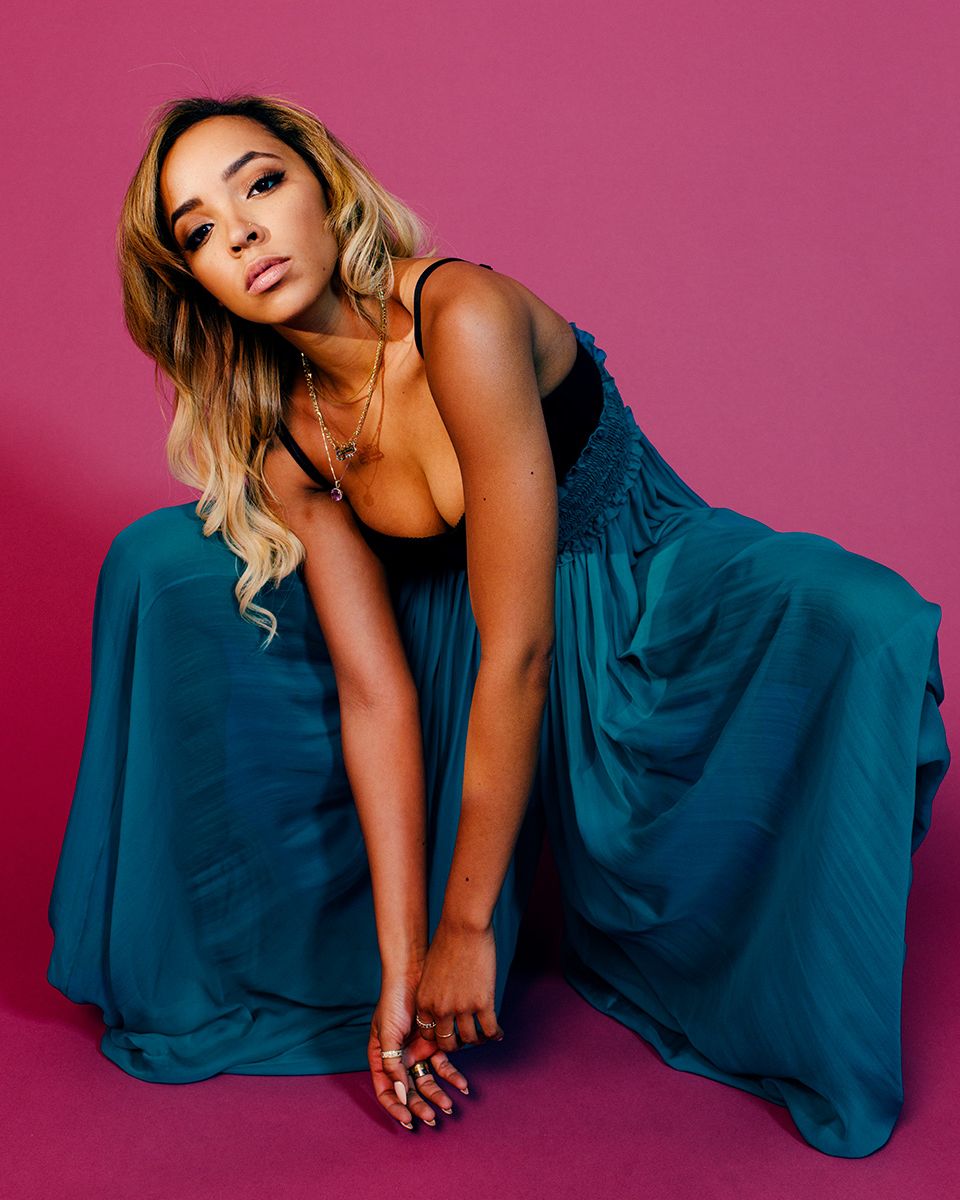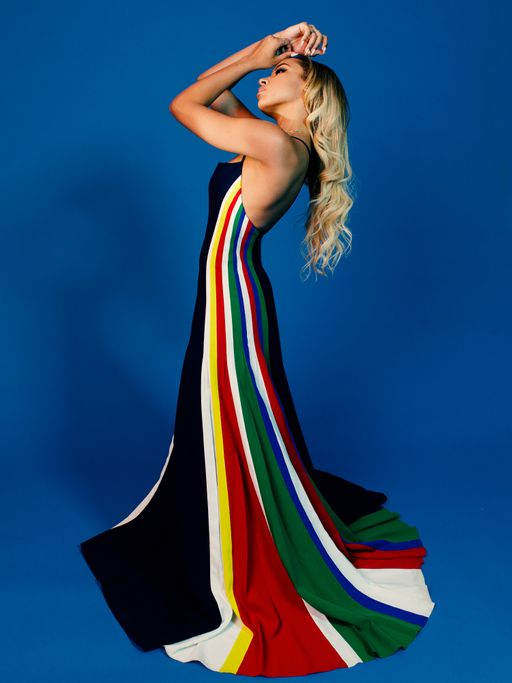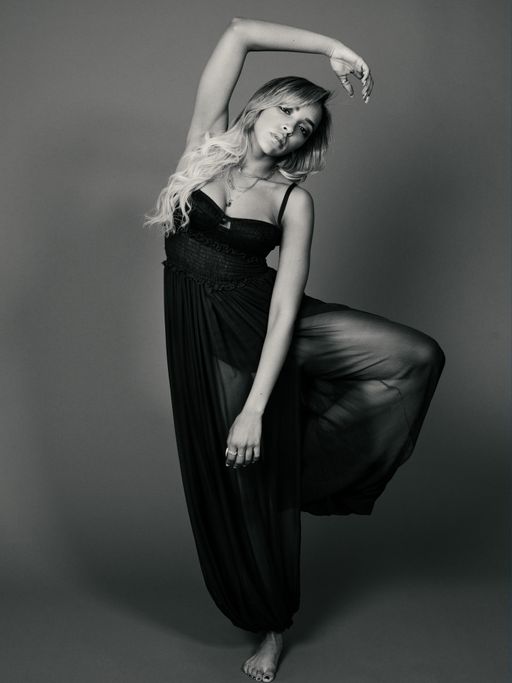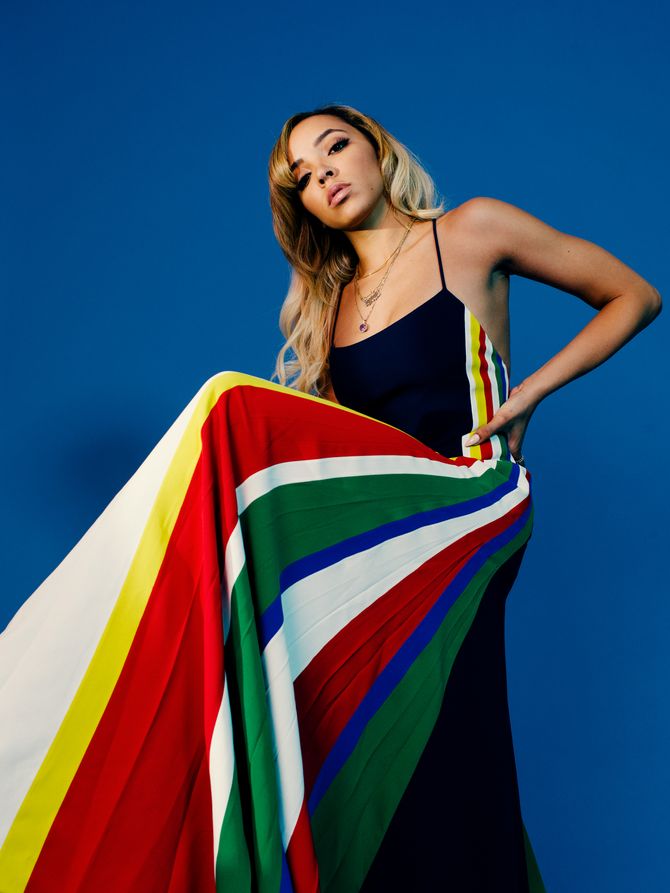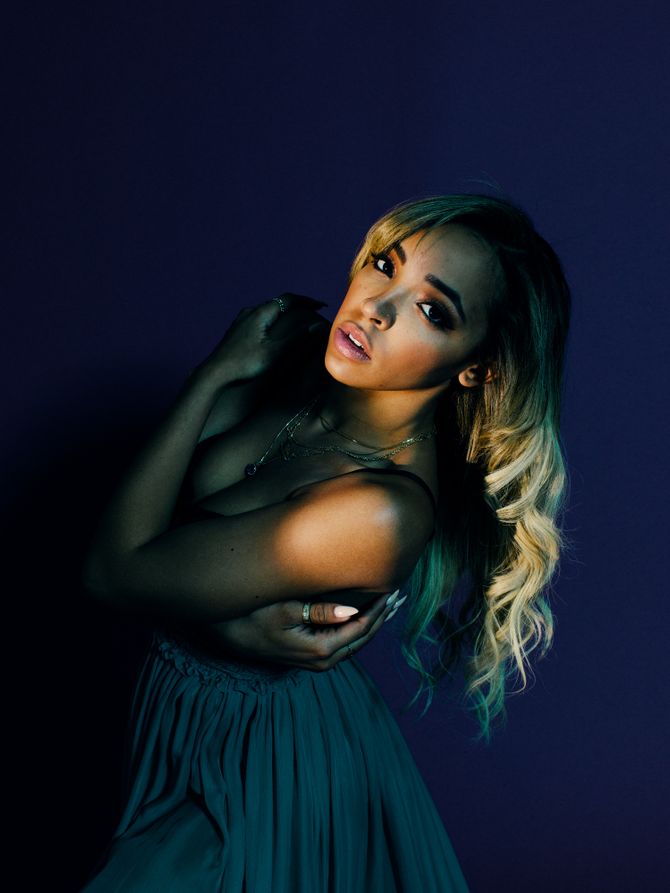“I need to regain control,” Tinashe says, eyeing a speaker across the room in the New York offices. She catches the irony of her comment quick enough to clarify that she’s talking about a playlist she curated, which someone at her record label, RCA, tinkered with without consulting her, because she could just as easily be describing the last three years of her career. Since 2015, the 25-year-old singer has been talking to anyone who will listen about her forthcoming sophomore album, Joyride. It was intended for release that year. Then 2016. Then 2017. Then …
Singles sparked up, then fizzled out; a tour for the album was attempted, then canceled; in 2016, she released a mixtape, Nightride, for free. Amid the delay, Tinashe would lash out at her label in private messages to fans on Twitter, accusing RCA of prioritizing labelmate Zayn Malik’s debut solo album over her own work. To get their attention, she leaked her own lead single. A collaboration with Britney Spears and invitation to dance in a Janet Jackson tribute, at Janet’s request, followed. Still, there was no album to show for her troubles. In a week, the wait will be over: Joyride arrives April 13, still on RCA.
Given the long road and detours it took to get here, it’d be fair to expect a chip on Tinashe’s shoulder – some lingering resentment or paranoia that the other shoe could still drop. But she’s surprisingly unbothered when she arrives at New York in late March, with a small entourage wholly invested in her interests. A publicist lets it be known that the artist has vetoed any looks that are too frilly. Great care is taken to queue up the right music (a mix of YG and Belly, plus that “weird” new Lil Dicky song) for her to slip into her natural, dancer’s zone for the photo shoot. She is impossibly flexible, holding contorted poses long enough to elicit gasps from the room. For the first time in a long time — and maybe ever — what Tinashe wants, Tinashe gets. The singer spoke to Vulture about her setbacks, not being a music industry prisoner, dating in the age of Instagram, and creative control.
Sometimes the narrative surrounding albums overshadow the actual album. Is that a concern with Joyride?
There were a lot of setbacks. I made the mistake of even talking about the project too soon. When I look back on the entire journey of it, I’m very thankful for the time that it did take. It pushed me to create the version of the album that is coming out now. It was important that it ended up taking as long as it did.
SZA told us last year about her label needing to pry the masters for her album out of her hands so they could put it out. She got in her own way, essentially. Did you experience that?
Not quite that. I’m a perfectionist, but at the same time, I’ve been living with a lot of this music for years now. When you’re obsessing over songs every single day, you don’t understand the thousands of times you can listen to a record. Eventually, you gotta be done. Three versions of this album exist, but there are probably 200 songs.
What made this the one you landed on?
It just feels right, complete, and urgent. It represents me. It accomplishes what I wanted, sonically, which was to create this music that feels like it borrows from different genres, but it’s hard to place all the songs in a specific genre. I’ve always felt more comfortable as an artist being that way. The subject matter and energy is also up and that was important to me, too. I wanted to be excited [about this record] and have it be in your face.
“No Drama” lets out a moment of frustration about the way the industry relies on packaging and selling its artists. “Tried to be myself but they won’t AKA me / AKA a pop star AKA a problem / AKA don’t hold me back,” you sing. How have you navigated those dueling motives?
I’ve never felt like I needed to box myself in. So it was always extremely confusing and frustrating for me when people tried to do that with my music. It minimized me. They were trying to make me one thing or another when really I can be a melting pot of different things. That’s what makes people human: We have different dimensions. To expect that from a music artist or the music itself is just very simple-minded.
I don’t think it’s a reach to say that it’s expected more of women than it is of men. No one’s categorizing Post Malone.
Yeah. “What are you Post Malone?” There’s this crazy competition factor that comes with women that men don’t really have to deal with. It’s a huge battle I’ve had to educate people on: that by being versatile and having different influences, that doesn’t mean it’s unfocused or not direct or any of those other negative adjectives that people can throw on me.
So much of fan culture now feeds on instant gratification, and if you’re not Beyoncé immediately out of the gate, then you’re considered a flop.
I was literally just saying that yesterday.
The industry has chewed up and spit out plenty of Tinashes. What has kept you from quitting?
I get [called a flop] all the time. It becomes a mental game at that point. You can’t let people break you or let those titles and peoples’ misconceptions about you get you down. We’re still out here grinding, playing shows and in studios. All that stuff is important. The biggest thing for me is having no plan B and knowing I would never give up. It’s not a matter of if, it’s how and when.
How much of what people will hear next week existed on the original version?
Not much. Maybe 20 percent or less. The title track, but there was a period of time where I lost it.
Right. I’d read that Rihanna took it, wanting it for Anti, but then the song made its way back to you.
We bought it back. It’s kind of crazy and I’m not even 100 percent sure what happened. We created the track, I wanted it for my project, then all of a sudden I found out — I was told — that she had purchased the whole concept and beat for her project. Eventually when that didn’t come out on her project, I was like, “yup … still want it!” I named my album after it. A couple other songs that I toured when I did my brief version of the Joyride tour will be on it. Most of the rest of the album was created relatively recently.
That story is almost identical to Rihanna taking “Consideration” from SZA. It’s funny because we say “music business” forgetting the strictures that come with the second part of that phrase. As an artist who writes for herself and others, and produces, how do you fight for ownership in this business?
And at least Rihanna left SZA on the song. That’s nice. It’s interesting because you’re collaborating with a lot of different people who are also adding pieces and parts to your music. So when that happens, you have to have a good amount of synergy. It is a business and there are business opportunities that people want to take. For me, it’s about maintaining the core and staying focused on making the best music. Anything else that happens along the way, we figure it out and roll with the punches. When I did lose the track, we just made a bunch more. There’s always music to be made.
You’ve written this album throughout your early 20s. How was it excavating your thoughts during such a transitional period to make this album?
I’ve changed a lot since 2015. There have been highs and lows. At the beginning, I was super excited about it and anxious to put out a project [snaps fingers] right off the bat of my first album. That’s probably why I initially told everyone about it, which is a mistake I’ll never make again. Then there was a period when I got down on myself when the project didn’t come out when I said it was going to. I felt embarrassed and that people were disappointed. I had to delay my tour because my album didn’t come out. I planned that tour way too soon. After that, I had a mini confidence crisis where, for the first time, I could feel thoughts of doubting myself seeping in. That was disturbing. Then I had to go through a third evolution mentally where I had to regain control.
At that point, I decided to build a studio house in the [Hollywood] Hills that was going to be my creative sanctuary where I just honed in on finishing the project. No more fucking around. I’m gonna make sure this is the way I envisioned it. Once I brought in producers and writers, we were in there every day being creative — painting, writing, graphic design. We set the vibe, had Taco Tuesday parties. That was a huge turning point for me. Once that summer happened, I regained a huge sense of confidence and purpose: Okay, I’m doing this. I really made this happen. I’m gonna make my best music ever. That’s what we did.
You’ve talked before about this need to prove yourself. Prove what to whom?
I don’t know. I always feel like an underdog. Underestimated. I feel like I have to prove that I’m serious and here to stay, that I’m not just a cute girl. Sometimes I think people think I’m stupid or that my art is not real art. Those things always bother me.
Where is that criticism coming from?
Myself. When you’re a super perfectionist, set unreasonably high expectations, and don’t hit them, you can be hard on yourself. I’m my harshest critic because I put the most pressure on myself. But I also manage it pretty well, all things considered. I never let it break me. I think I thrive under pressure.
There are a lot of musicians in your position sitting in the passenger seat of their own career. You seem resistant to letting that happen.
It’s easy to let that happen. No one really gives a fuck if your career works or not, as far as the music business goes. They’re making money from lots of different artists. You have to be your biggest motivator and the creator of your own destiny. You can’t let yourself get complacent or discouraged. It’s way easier to quit than keep going.
Do you feel you had full creative control over this album?
Um, yeah. Yes. At this point, for sure. There were times along the way were there were creative discrepancies, but I’m happy to say that this project is all me. Everything from the cover art, to the sequencing, to the number of seconds in between the tracks, that’s me. I even started DMing Little Dragon, as a fan, around 2014 and eventually got them for “Stuck With Me.” I was so excited because this is the only feature I’ve ever facilitated on my own. And through Instagram! Shout-out to the DMs, making things happen.
There have been many hiccups that, from the outside looking in, seemed not your choice: that photo shoot with Terry Richardson, the Chris Brown collaboration and resulting fallout, the unreleased Dr. Luke tracks. Did you have a say in any of these things?
There were lots of things. Sometimes you’re like, “Why meeeee?” The biggest thing that I’ve learned is, not everything is so important. At the time, it feels so incredibly detrimental. But it’s okay, you can get up. There’s more work to be done. They were setbacks, but I’m gonna be fine.
Has being so transparent about these setbacks hurt your career?
I think it’s helped and hurt. It’s given people insight [into how the industry works], which I think my fans have appreciated. What has potentially hurt is: I don’t want people to look at it as (a) I’m a prisoner in my deal because that’s not accurate. Or that I’ve been forced to do things. I’ve been forced to do a couple things, but there’s a certain amount of compromise that has to be done in the music industry that I’m a participant in. And (b) I don’t want people to think I’m whiny or entitled. None of my feelings come from that. Sometimes I’m just speaking my current truth.
There’s nothing whiny about speaking up for yourself.
It’s something a lot of women deal with all the time. It’s the same concept of if you stand up for yourself, then you’re a bitch. It comes from the same mind-set: “Shut up and sing.” Instead of expressing how I feel about this industry.
The tone of this album is cocksure and defiant. I imagine that was intentional.
Definitely. It’s how I feel right now. I feel more sure of myself than I did on my first album. I don’t ever wanna come from a position of vulnerability again. I feel powerful, confident, and happy, like this is it. The music reflects that. There’s emotion still, but it doesn’t ever have to feel [sad]. The last song, “Fire and Flames,” especially, is about understanding and calmness and things will be as they will be. I’m taking life as it comes, which is the theme of the Joyride universe. The lows are part of the journey, and I feel centered knowing that.
You recently went public with your boyfriend, NBA rookie Ben Simmons. As a pop star of the social-media generation, how do you navigate wanting to share your personal joys without oversharing?
I’m pretty private and guarded about how I move day to day, so I never really tap into the tabloid scene. It’s always been something that people have asked why I don’t do more of. It’s interesting that people care. I’ve always thought that if I make great art that should be enough, so it’s interesting to me that it’s interesting to other people. But I’m new to this! I’ve never posted about a boy before. It’s a whole new experience. But when you’re happy, you want to be able to share that.
At 25, have you reached the feeling of I’m enough?
No. I’ve never felt that way and I don’t think I ever will. I’ll always feel like I can improve. I want to be a better performer, singer, dancer. Be smarter and more well-rounded. Be a better human being. But at the same time, I know what I’ve got. I know I’m good at what I do. I know I deserve to be where I am because I’ve worked really fucking hard.
I remember reading that you keep a photo of a Grammy as your phone’s background. Do you still?
[Shows me her phone.] Yes! This is my vision board. It’s kind of annoying because it’s been my background for four years. Can I just change it please? But I told myself I wasn’t going to until I got one. I don’t even feel the same way about the Grammys as I did when I made this my background. Growing up, that was a huge, important thing for me. Now, the more I realize that nothing really matters, it’s not that big of a deal. But because it meant something to me then, it still holds something special to me. It remains a stupid goal I want to achieve.
This interview has been edited and condensed.
Styling by Lindsay Peoples.
